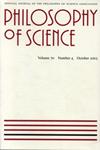对概率风险评估的信心
IF 1.4
2区 哲学
Q1 HISTORY & PHILOSOPHY OF SCIENCE
引用次数: 0
摘要
认识上的不确定性作为二阶概率被纳入概率风险评估(PRA),代表科学家对模型正确性的相信程度。在本文中,我提出了另一种方法,将科学家对给定数量的概率集的信心纳入其中。首先,我提出了一些反对在风险分析中使用精确概率来估计科学不确定性的论点。然后,我将布赖恩-希尔(Brian Hill)和理查德-布拉德利(Richard Bradley)开发的 "置信度方法 "推广到 PRA 中。最后,我宣称这种方法比标准(贝叶斯)方法更能体现模型的不确定性。本文章由计算机程序翻译,如有差异,请以英文原文为准。
Confidence in Probabilistic Risk Assessment
Epistemic uncertainties are included in probabilistic risk assessment (PRA) as second-order probabilities that represent the degrees of belief of the scientists that a model is correct. In this paper, I propose an alternative approach that incorporates the scientist’s confidence in a probability set for a given quantity. First, I give some arguments against the use of precise probabilities to estimate scientific uncertainty in risk analysis. I then extend the “confidence approach” developed by Brian Hill and Richard Bradley to PRA. I finally claim that this approach better represents model uncertainty than the standard (Bayesian) one.
求助全文
通过发布文献求助,成功后即可免费获取论文全文。
去求助
来源期刊

Philosophy of Science
管理科学-科学史与科学哲学
CiteScore
3.10
自引率
5.90%
发文量
128
审稿时长
6-12 weeks
期刊介绍:
Since its inception in 1934, Philosophy of Science, along with its sponsoring society, the Philosophy of Science Association, has been dedicated to the furthering of studies and free discussion from diverse standpoints in the philosophy of science. The journal contains essays, discussion articles, and book reviews.
 求助内容:
求助内容: 应助结果提醒方式:
应助结果提醒方式:


